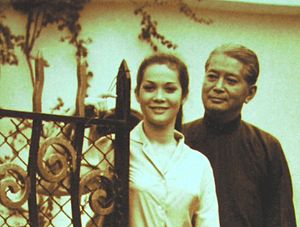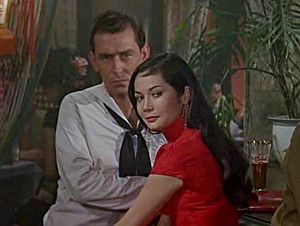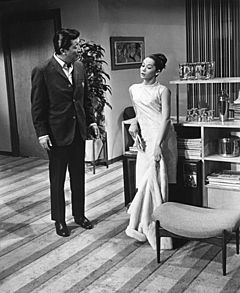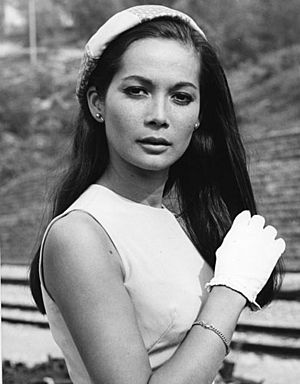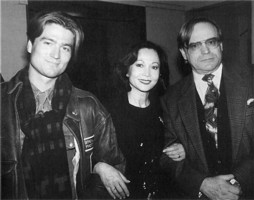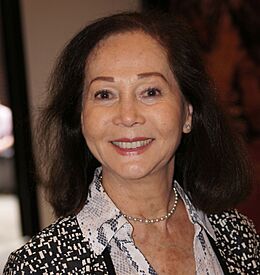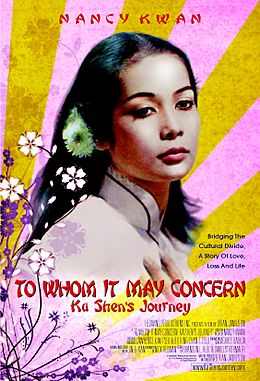Nancy Kwan facts for kids
Quick facts for kids
Nancy Kwan
|
|||||||||||||||||
|---|---|---|---|---|---|---|---|---|---|---|---|---|---|---|---|---|---|
| 關家蒨 | |||||||||||||||||
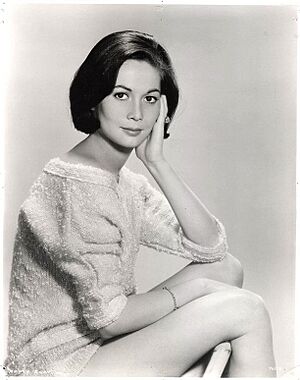
Kwan in 1964
|
|||||||||||||||||
| Born | May 19, 1939 |
||||||||||||||||
| Education |
|
||||||||||||||||
| Occupation |
|
||||||||||||||||
| Years active | 1960–present | ||||||||||||||||
| Known for |
|
||||||||||||||||
| Spouse(s) |
|
||||||||||||||||
| Relatives | Loke Yew (great-grandfather) | ||||||||||||||||
| Chinese name | |||||||||||||||||
| Traditional Chinese | 關家蒨 | ||||||||||||||||
| Simplified Chinese | 关家蒨 | ||||||||||||||||
|
|||||||||||||||||
Nancy Kwan Ka-shen (born May 19, 1939) is a Chinese-American actress. Her acting career became very successful in the 1960s. This was a time when Hollywood started to cast more Asian actors in movies, especially in comedies. She was seen as a very popular and admired actress from the East during that decade.
Contents
About Nancy Kwan
Her Early Life
Nancy Kwan was born in Hong Kong on May 19, 1939. She grew up in the Kowloon Tong area. Her father, Kwan Wing-hong, was a Cantonese architect. Her mother, Marquita Scott, was a European model with English and Scottish family. Nancy's parents met in London and then moved to Hong Kong. Her father became a well-known architect there.
When Nancy was two years old, in 1941, her parents divorced. Her mother went to England during World War II. She never returned to the family in Hong Kong.
During Christmas of 1941, the Japanese army invaded Hong Kong. To escape, Nancy's father dressed as a coolie and hid Nancy and her older brother, Ka-keung, in wicker baskets. Servants helped transport them past Japanese guards. They lived in western China for five years until the war ended. After the war, they returned to Hong Kong. They lived in a modern home that her father designed. Her father married a Chinese woman, whom Nancy called "Mother." Her father and stepmother raised Nancy, her brother, and five half-brothers and half-sisters. Many of Nancy's siblings became lawyers.
Nancy had a comfortable childhood, except during World War II. A woman called an amah (阿嬤) helped care for her. Nancy had a pony and spent her summers at resorts in Borneo, Macao, and Japan. Her father was wealthy and owned a large property on a hilltop in Kowloon. When she was young, people called her "Ka-shen."
Nancy went to the Catholic Maryknoll Convent School until she was 13. Then, she went to Kingsmoor School in Glossop, England. This was a private boarding school that her brother Ka-keung also attended. Her brother studied to become an architect, and Nancy studied to become a dancer.
Nancy became interested in ballet after learning tai chi. When she was 18, she went to the Royal Ballet School in London to become a ballet dancer. She learned about stage make-up and danced for four hours every day. She also continued her high school studies at the same time. Her high school had strong connections with local theater groups. This allowed Nancy to perform small parts in several plays. After high school, she traveled to France, Italy, and Switzerland. Then, she went back to Hong Kong and started her own ballet school.
Starting Her Acting Career
A stage producer named Ray Stark placed an advertisement in a Hong Kong newspaper. He was looking for an actress to play the character Suzie Wong in a play. Nancy applied and was discovered by Stark at a film studio. After her first audition, she was asked to try out for the movie The World of Suzie Wong. Stark chose Nancy because he felt she would be more widely accepted by audiences.
Nancy's first screen test was not very good, but it showed her potential. She then trained with drama teachers for four weeks. Her second screen test was much better. She did a third screen test after four months. There was a debate about whether to choose Nancy or another actress, France Nuyen.
Because Nancy did not have much acting experience, Stark asked her to go to the United States. She attended acting school in Hollywood and lived in a supervised dormitory with other young actresses. Later, she moved to New York. Nancy signed a seven-year contract with Stark's company, Seven Arts Productions. She started with a salary of $300 a week. She later said this was "a lot of money to me then."
When The World of Suzie Wong play began its tour, Nancy was given a small supporting role. She also became an understudy for the main actress, France Nuyen. Even though Stark and the male lead, William Holden, preferred Nancy, she did not get the main movie role at first. Paramount Pictures wanted France Nuyen, who was already famous. Nancy was very disappointed and almost quit. Stark believed Nancy was too new to acting for the main movie role at that time.
Nuyen was later fired from the movie role because of some erratic actions. The film's director was also replaced. Nancy, who had never been in a film before, was chosen over 30 other actresses from different countries. On February 15, 1960, she began filming the movie in London with William Holden.
During filming, Nancy had a difficult time with one scene. In the scene, her character's Western dress is removed. The director was not happy with Nancy's underclothes. He wanted her to wear less modest clothing. Nancy was very upset and cried in her dressing room. Stark told her that she needed to wear the requested clothes or she would be removed from the movie. Nancy returned to the set and continued filming.
Because Nancy had a mixed background (Eurasian), the film's make-up artists tried to make her look more Chinese. They changed her eyebrows and drew a line on her forehead. In other movies where Nancy played Asian characters, make-up artists often reshaped her brown eyes. The filming of The World of Suzie Wong took five months, which was a long time for movies back then.
Becoming a Star
The World of Suzie Wong was a huge success at the box office. Critics praised Nancy Kwan's performance. She was sometimes called "Chinese Bardot" because of her memorable dance. In 1960, Nancy and two other actresses, Ina Balin and Hayley Mills, won the Golden Globe for "Most Promising Newcomer–Female." The next year, she was voted a "Star of Tomorrow." Experts say that Suzie gave an Asian actress, Nancy Kwan, the most important Hollywood role since Anna May Wong in the 1920s.
After The World of Suzie Wong, Nancy was not ready for how famous she became. She noticed people staring at her in Hong Kong. She realized she was the one they were looking at. She said it was better in Beverly Hills because it was a bigger place, and she could walk around without being noticed as much. When people talked to her father after seeing the movie, they often called him "Mr. Wong," which he did not like. Nancy said that even decades later, people still sent her many letters about the film.
A famous image from the movie shows Nancy Kwan lying on a sofa, wearing a beautiful cheongsam. This Chinese dress has a high collar and slits on the sides. This image became very well-known. Nancy Kwan was on the cover of Life magazine in October 1960. This helped make her a very popular and admired actress in the 1960s. The cheongsam she wore was even nicknamed the "Suzie Wong dress." Nancy said she "loved" the cheongsam, calling it a "national costume." She explained that it "has slits because Chinese girls have pretty legs" and "the slits show their legs."
Some Chinese and Chinese-Americans were upset about how Chinese women were shown in movies. In 1961, Nancy starred in Flower Drum Song, playing a similar type of role. This film was special because it was the "first big-budget American film" with an all-Asian cast. Nancy did not sing the songs in the musical film; another singer performed the vocals for her character. Nancy found Flower Drum Song harder than Suzie Wong because her character was "more go-getter." Her ballet training helped her a lot in Flower Drum Song, where she had many dance scenes.
After these two films, Nancy Kwan became a huge celebrity. Her fame was at its highest in 1962. Besides being on the cover of Life magazine, she was featured in a popular women's magazine, McCall's, in an article called "The China Doll that Men Like."
As a Hollywood star, Nancy Kwan lived in a house in Laurel Canyon in Los Angeles. She drove a white British sports car and enjoyed dancing to Latin music. She liked listening to Johnny Mathis records and reading Chinese history books. In 1962, when she was 22, Nancy Kwan was dating Swiss actor Maximilian Schell. She said she did not plan to marry until she was older, maybe 24 or 25.
In 1961, Nancy Kwan offered to teach Chinese to the King's Own Yorkshire Light Infantry. This army group was training for a mission in Malaya (now part of Malaysia). Their commanders thought the soldiers should learn Chinese and how to use chopsticks. Captain Anthony Hare publicly announced they needed an attractive teacher. Nancy, who was in Hollywood, sent a message saying she was fluent in Chinese, good with chopsticks, and liked uniforms. Captain Hare said she was "too beautiful" and would be "too much of a distraction." Her offer was not accepted because another Chinese woman had already been chosen.
The Nancy Kwan Haircut
In 1963, Nancy Kwan's long hair, which was famous from The World of Suzie Wong, was cut into a modern bob style. This was for the film The Wild Affair, at the request of the director. The haircut was designed by London hairdresser Vidal Sassoon. Nancy's new bob cut received a lot of attention for its "severe geometry." Sassoon's special cut for Nancy's hair was called "the Kwan cut," "the Kwan bob," or simply "the Kwan." Pictures of her new hairstyle appeared in both the American and British editions of Vogue magazine.
Later Films and Life
Nancy Kwan's early success was not always matched in later years. This was partly due to the culture in 1960s America. She found that she had to travel to Europe and Hong Kong to avoid being given only Asian roles in Hollywood, even though she had a mixed background.
Her third movie was the British drama film The Main Attraction (1962) with Pat Boone. She played an Italian circus performer. While filming in the Austrian Alps, she met Peter Pock, a hotelier and ski teacher. They fell in love and married after several weeks. They lived in Innsbruck, Tyrol, Austria. Nancy later gave birth to their son, Bernhard "Bernie" Pock. Nancy's film contract meant she traveled a lot for movies. She found it hard to be away from her young son. Bernie had fair skin and blue eyes, looking like his father.
In 1963, Nancy starred as the main character in Tamahine. For this role, she wore contact lenses to make her eyes look blue. She played an English-Tahitian girl living with a headmaster at an old English school. Critics praised her "charming depiction" of the character.
In Fate Is the Hunter (1964), her seventh film, Nancy played a scientist who studies fish. This was her first role as a Eurasian character. Nancy often played funny characters, which she said were harder than serious roles because they needed more energy and precise timing.
Nancy Kwan met Bruce Lee when he choreographed martial arts moves for the film The Wrecking Crew (1969). In the film, Nancy's character fought Sharon Tate's character using a flying kick. This move came from her dance training, not karate. She became good friends with Lee and his family. In the 1970s, both Nancy and Lee returned to Hong Kong and continued their friendship.
Nancy divorced Peter Pock in June 1968. She married Hollywood screenwriter David Giler in July 1970. They divorced in 1971.
That year, Nancy returned to Hong Kong with her son because her father was ill. She planned to stay for a year but ended up staying for about seven years. She continued working, starring as Dr. Sue in the film Wonder Women (1973). While in Hong Kong, Nancy started her own production company, Nancy Kwan Films. It mainly made advertisements for people in Southeast Asia. In the 1980s, she returned to the United States. She appeared in TV shows like Fantasy Island, Knots Landing, and Trapper John, M.D..
In 1976, Nancy Kwan married Norbert Meisel, who is an actor, director, screenwriter, and producer. Like her first husband, Peter Pock, Meisel was Austrian. She once said, "I have my Austrian karma."
In 1993, Nancy Kwan mentioned that her son Bernie was often called a "blond, blue-eyed Chinese" because he spoke the language very well. In 1979, they both returned to the United States so Bernie could finish his schooling there. Bernie was an actor, a martial artist, and a stunt performer. For the 1991 action comedy film Fast Getaway, he performed a dangerous stunt. He and another stunt performer leaped off the Royal Gorge Bridge, falling 900 feet before being stopped by ropes. Nancy and Bernie also recorded a tape about tai chi.
Later Years and Contributions
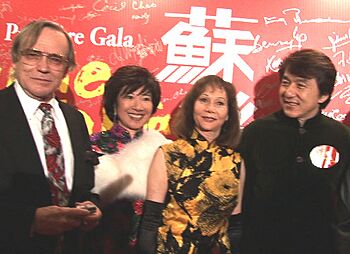
In 1987, Nancy Kwan helped start a restaurant called Joss Cuisine. She, producer Ray Stark, and director Cecile Tang helped fund the restaurant in West Hollywood.
Nancy Kwan sometimes records audiobooks. In 1995, she recorded an audiobook for Anchee Min's book Red Azalea. In 2011, she recorded an audiobook for the 1989 book When Heaven and Earth Changed Places. Critics praised her voice and pronunciation in these recordings.
In 1993, she played Gussie Yang in the film Dragon: The Bruce Lee Story. This character was a "tough-talking, soft-hearted Hong Kong restaurateur." She played an important role, helping Bruce Lee get money to open a martial arts school.
In May 1993, Nancy finished making a film about people of mixed European and Asian heritage called Loose Woman With No Face. She wrote, directed, and starred in this film. She described it as "a slice of life about Euro-Asians in Los Angeles."
In 1993, Nancy was asked if she faced racism as an Asian Hollywood actress in the 1960s. She said, "That was 30 years ago and (prejudice) wasn't such a heavy issue then. I was just in great Broadway productions that were turned into films. I personally never felt any racial problems in Hollywood." In the 1990s, she found it harder to get strong roles. She thought this was because of her age and because the movie industry did not often choose Asian actors for non-Asian roles. In earlier years, she had played Italian and Tahitian characters.
In the 1990s, more Hollywood films were made about Asian people. Nancy could have been in the 1993 film The Joy Luck Club. However, she chose not to because the filmmakers would not remove a line that called The World of Suzie Wong a "horrible racist film."
In November 1993, Nancy Kwan co-starred in a play called Arthur and Leila. It was about two siblings dealing with their Chinese identities. The play was performed in San Francisco and Los Angeles. Critics praised Nancy's acting in the play.
In 1994, an article said that she kept her "dancer's figure" by practicing the Chinese martial art tai chi and dancing often. That year, she played a 52-year-old character named Martha in a play called Who's Afraid of Virginia Woolf? in Singapore.
In 1995, she produced and acted in the film Rebellious. Her son, Bernie, directed, wrote, and starred in the film.
In 1996, Nancy's son, Bernie, died at the age of 33. Four years after his death, poet and actress Amber Tamblyn dedicated her first poetry book, Of the Dawn, to Bernie. Tamblyn had acted in Rebellious when she was nine. She called Bernie a "big brother" and said he was the "first guy" to encourage her to share her poems.
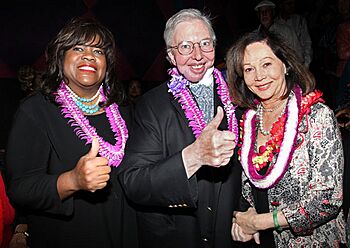
Nancy Kwan has appeared in television commercials, even into the 1990s. She was also a spokesperson for a cosmetic product called "Oriental Pearl Cream."
Nancy Kwan has been involved in charity work for AIDS awareness. In 1997, she published a book called A Celebration of Life – Memories of My Son. It was about her son. She gave the money from the book and a movie she made about him to support AIDS research and awareness.
On March 17, 2006, Nancy Kwan and her husband, Norbert Meisel, attended the first performance of the Hong Kong Ballet's show based on Suzie Wong. Nancy told a newspaper in 2007 that she did not plan to retire. She believes that retiring without a plan can lead to problems. Nancy said, "I hope I'm working until the day I die. If work is a pleasure, why not?" In 2006, Nancy reunited with her Flower Drum Song co-star James Shigeta. They performed a two-person play called Love Letters in Los Angeles and San Francisco.
Nancy Kwan appeared in Arthur Dong's 2007 documentary Hollywood Chinese. In it, she and other Chinese figures discussed the achievements and challenges of Chinese people in the film industry.
Nancy Kwan and her husband Norbert Meisel write and direct films about Asian-Americans. Nancy believes that Asian actors are not cast enough in films and TV shows. So, they decided to create their own stories and films with Asian characters. In 2007, they wrote, directed, and produced Star of Sunshine. This film tells the story of a young girl named Rachel who is a talented pianist. She searches for her father, a musician who left her when she was young. In Sunshine, Nancy plays the manager of a jazz club who knows a secret about Rachel. In the final scene of the film, Nancy dances, which she has loved since she was young.
Nancy Kwan wrote an introduction for the 2008 book For Goodness Sake: A Novel of the Afterlife of Suzie Wong. This book was written by American author James Clapp.
Nancy Kwan is a spokeswoman for the Asian American Voters Coalition. This is a political group started in 1986 to help Asian actors.
During her career, Nancy Kwan has appeared in two television series and over 50 films. As of March 2011, she continued to work as a film screenwriter and executive.
Nancy Kwan currently lives in Los Angeles. She also has family members in Hong Kong and visits there every few years.
Filmography
Film Roles
| Year | Title | Role | Notes |
|---|---|---|---|
| 1960 | The World of Suzie Wong | Suzie Wong | |
| 1961 | Flower Drum Song | Linda Low | |
| 1962 | The Main Attraction | Tessa | |
| 1963 | Tamahine | Tamahine | |
| 1964 | Honeymoon Hotel | Lynn Jenley | |
| 1964 | Fate Is the Hunter | Sally Fraser | |
| 1965 | The Wild Affair | Marjorie Lee | Filmed in 1963 |
| 1966 | Lt. Robin Crusoe, U.S.N. | Wednesday | |
| 1966 | Drop Dead Darling | Baby | AKA, Arrivederci, Baby! |
| 1966 | Mong fu sek | Mei Ching | Short film |
| 1967 | The Peking Medallion | Tina | AKA, The Corrupt Ones |
| 1968 | Nobody's Perfect | Tomiko Momoyama | |
| 1968 | The Wrecking Crew | Wen Yurang | |
| 1969 | The Girl Who Knew Too Much | Revel Drue | |
| 1970 | The McMasters | Robin | |
| 1971 | Karioka etchos de America | ||
| 1973 | Wonder Women | Dr. Tsu | |
| 1974 | Bu zai you chun tian | ||
| 1974 | The Pacific Connection | Leni | |
| 1975 | Fortress in the Sun | Maria | |
| 1975 | Super... | Yuki Chan | |
| 1975 | That Lady from Peking | Sue Tenchan | |
| 1976 | Project Kill | Lee Su | |
| 1978 | Out of the Darkness | Leslie | AKA, Night Creature |
| 1979 | Streets of Hong Kong | Mei Mei | |
| 1982 | Angkor: Cambodia Express | Sue | |
| 1985 | Walking the Edge | Christine Holloway | |
| 1988 | Keys to Freedom | Dr. Lao | |
| 1989 | Night Children | Diane | |
| 1990 | Cold Dog Soup | Madame Chang | |
| 1993 | Dragon: The Bruce Lee Story | Gussie Yang | |
| 1995 | The Golden Girls | ||
| 1995 | Rebellious | Joni | |
| 1996 | For Life or Death | Ling Li | |
| 1998 | Mr. P's Dancing Sushi Bar | Mitsuko McFee | |
| 2005 | Murder on the Yellow Brick Road | Natalie Chung | |
| 2006 | Ray of Sunshine | Lilly | |
| 2016 | Paint It Black | Margaret | |
| 2016 | Window Horses: The Poetic Persian Epiphany of Rosie Ming | Gloria (voice) |
Television Roles
| Year | Title | Role | Notes |
|---|---|---|---|
| 1968–69 | Hawaii Five-O | Rosemary Quong | "Pilot", "Cocoon: Parts 1 & 2" |
| 1974 | Kung Fu | Mayli Ho | "The Cenotaph: Parts 1 & 2" |
| 1976 | Hadleigh | Kai Yin | "Hong Kong Rock" |
| 1978 | Fantasy Island | Adela | "The Appointment/Mr. Tattoo" |
| 1982 | Chicago Story | Hoanh Anh | "Not Quite Paradise: Parts 1 & 2" |
| 1983 | The Last Ninja | Noriko Sakura | TV film |
| 1984 | Trapper John, M.D. | Dr. Lois Miyoshiro | "This Gland Is Your Gland" |
| 1984 | Partners in Crime | Anna Chen | "Duke" |
| 1984 | Knots Landing | Beverly Mikuriya | "Hanging Fire" |
| 1985 | Blade in Hong Kong | Lily | TV film |
| 1986 | The A-Team | Lin Wu | "The Point of No Return" |
| 1988 | Noble House | Claudia Chen | TV miniseries |
| 1990 | Miracle Landing | C.B. Lansing | TV film |
| 1990 | Babies | Dr. Liu | TV film |
| 2000 | ER | Mrs. Chen | "Rescue Me" |
Awards and Recognition
- 1961 Golden Globe Award for Best Actress – Drama (Nominated) for The World of Suzie Wong
- 1961 Golden Globe Award for Most Promising Newcomer – Female, shared with Ina Balin and Hayley Mills
- Golden Ring Award
- Historymaker for Excellence in the Performing Arts – Chinese American Museum of Los Angeles, California
- Visionary Award – East West Players, April 28, 2003
- Lifetime Achievement Award – Chinatown, Los Angeles, June 2009
- Maverick Award – Hawaii International Film Festival, October 2010
- Lifetime Achievement Award – San Diego Asian Film Festival, October 2011
- Lifetime Achievement Award – Museum of Chinese in America, November 2015
- AHF Inductee & Lifetime Achievement Award - Asian Hall of Fame, 2021
See also
 In Spanish: Nancy Kwan para niños
In Spanish: Nancy Kwan para niños
- Anna May Wong, a Chinese-American Hollywood actress, active in the early 20th century
- Kevin Kwan, Singapore-American author, distant cousin to Nancy Kwan
 | Mary Eliza Mahoney |
 | Susie King Taylor |
 | Ida Gray |
 | Eliza Ann Grier |


